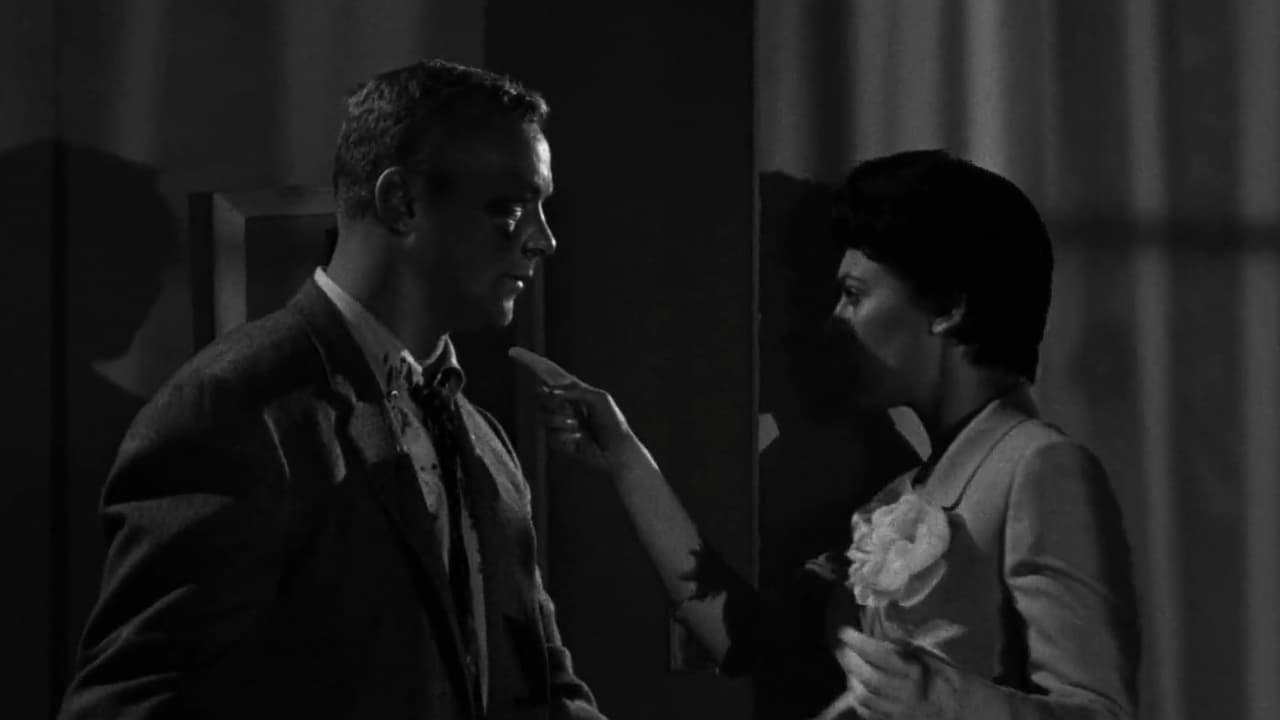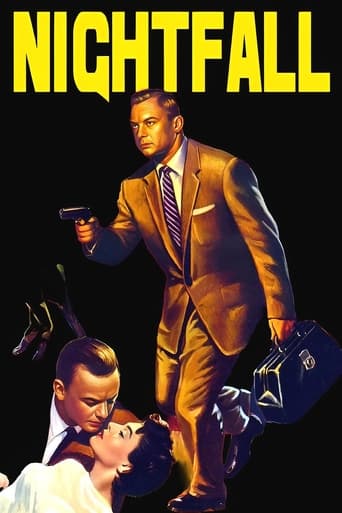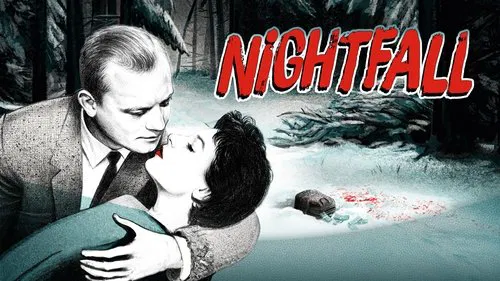



A Disappointing Continuation
Fun premise, good actors, bad writing. This film seemed to have potential at the beginning but it quickly devolves into a trite action film. Ultimately it's very boring.
View MoreEach character in this movie — down to the smallest one — is an individual rather than a type, prone to spontaneous changes of mood and sometimes amusing outbursts of pettiness or ill humor.
View MoreIt really made me laugh, but for some moments I was tearing up because I could relate so much.
View MoreAs a longtime fan of Out of the Past I was disappointed when I finally saw Tourneur's "other" noir film. Despite excellent cinematography and several good scenes, the movie is sunk by a poor leading man and a hopelessly flawed story. For the latter you can't blame Stirling Silliphant. His script is unusually faithful to the source novel, and therein lies the problem.Noir novelist David Goodis wrote a handful of bleak, pulpy novels published mostly during the 1950s. "Dark Passage" and "Shoot the Piano Player" are two other Goodis movie adaptations. Goodis' novels are tough, fatalistic, and violent with interesting premises and oddball characters, especially the bad guys. His problems, which worsened over time, were a reliance on outrageous coincidence and a tendency to have characters suddenly act in bizarre ways to make the story work out. These flaws lay at the heart of Nightfall's problems.Ordinary guy Jim Vanning (Aldo Ray) and his doctor friend (Frank Albertson) are out hunting when they witness an auto crash. They run to help only to discover two robbers fleeing a bank job. The crooks let the doctor patch them up, then kill him. But instead of shooting Vanning too, they concoct the preposterous notion of handing him a loaded rifle and ordering him to kill himself to set up an apparent murder-suicide. Naturally this gives Vanning a fighting chance. Unfortunately it doesn't pan out. Vanning is shot anyway. As the robbers escape in his car they pull the hoariest stunt in the book: they pick up the doctor's bag instead of the bag containing the loot. Vanning recovers (not dead, just stunned) and flees with the money. But somewhere in his flight he loses the bag. The crooks return to find Vanning and the money gone. The chase is on.The premise is appealing: the crooks hound Vanning to tell them where the money is but he really doesn't know. However the episodic narrative is strung together by coincidences and lapses of logic, beginning with the woman Vanning picks up in a bar (Anne Bancroft), who throws in with him for no discernible reason other than to provide someone for the crooks to menace. The crooks themselves (Brian Keith and Rudy Bond) have interesting conflicting personalities, but their disagreements always seem to arise just in time to save Vanning's neck. An interesting subplot involves an insurance investigator (James Gregory) who has been secretly shadowing Vanning. We learn more about his character than that of anyone else in the cast, but he ends up having little to do with the story's outcome.The final strike against Nightfall is delivered by Aldo Ray. As written Jim Vanning is basically an ordinary guy in way over his head, so scared that he jumps when a newsie suddenly turns on the lights of his newsstand. Vanning tells us he's frightened and weary. Unfortunately Aldo Ray is beefy and tough-looking. His raspy voice, which seems to get even more gravelly in flashbacks, combines with his features to give the impression he could tie the robbers into pretzels without breaking a sweat. Alas, appearance is all in movies, and Ray lacks the acting chops to make us believe this bruiser is an underdog.In conclusion I would recommend Nightfall as a technical exercise--it sure looks good--but there isn't enough substance to make a satisfying movie.
View MoreNightfall sees an innocent man drawn into a crime and trying to get out from under. He is being followed by two groups – one is an insurance investigator looking into the theft of a large amount of money that he believes James has, the other group are the men who actually stole the money but misplaced it and now also believe that James has it. The film follows this thread, using flashbacks to fill in the details while also moving he story forward. It is a pretty nice device as it goes, because it allows a lot of action to be happening at the same sort of time in the film even if events were further apart at either end of the story.The downside of the flashback device is that it is trigger by James telling "love interest" Marie about his past; Marie doesn't seem to exist for any other reason than enabling this plot device to be used, so when she is not being used this way then she feels a little bit redundant as a character and does get in the way a little bit. Despite this though the film does have a good pace to it and, more importantly, I liked how mean it was. Although it is not graphic (or even shown) the violence is suitably cruel and mean-spirited at several points – I like this because it adds real danger to the film. Equally, the two criminals have a friendly callousness to them where they don't make a big deal out of murder – they do it with the same air as they would stop you to ask the time, it is nicely played and again it adds to the threat level.Ray plays against this well, he isn't overly moral or innocent and he has a bit about him. Bancroft is OK but mostly is just a device and, when not being that, she does the obvious love interest thing – she often breaks the tough feel since she never convinces as a woman drawn into this violence dangerous world. The villains are the best played for my money though, don't know their real names but both have a morally vacant friendliness that is quite chilling for the film and the period. Tourneur directs well to make the most of this threat and I liked the delivery and structure.In the end it is what it is and it does the job well. The plot is straightforward but the structuring makes it more interesting and well paced, while the tough edge is effective in giving the action a real sense of threat and danger that makes it more engaging.
View MoreWhat makes a good film? Credible characters in incredible circumstances.That's what we get from Tourneur in this year. This is undeniably Tourneur's best year.Two of the most suspenseful films ever, this one and CURSE OF THE DEMON.This one has a lot of flashbacks. It is the sort of film that begins very ordinary, with a "status quo" effect, but the "status quo" is an illusion. There is nothing "status quo" about this, as we learn later.What works so well is the very thing that makes this a film that would be screwed up today. Indeed, it has been screwed up today. NO COUNTRY FOR OLD MEN is the same story, only not told as well.Why is that? Both are stories of an "Everyman" who chances upon mob money. Both have an aloof family man investigating the incident, caught up in a case seemingly over his head. Both have a psychotic killer.This one differs in the three dimensional characters. Today, the killers would have to be depicted as "gods" who couldn't be killed except by super humans. By today's standards, this film is the epitome of iconoclastic "blasphemy". It would horrify the beavis and buttheads of today by showing the outlaws to be mere mortals.And that's what makes this special. The two killers are real characters, not some made up one dimensional cutout. Real gangsters are mortals. They have their insecurities. That doesn't go over well today, probably because rich mobsters need to keep the "myth" alive that they are invulnerable.We wind up with five characters in search of....just in search. The five come to a climax, and it's quite credible. It wouldn't go over today, because too many people today have never been outside away from their safe cubicles. In 1957, there were more mature people, people who may not have been better, but certainly had a grasp of reality. Today, movie makers don't have to appeal to this crowd. They only have to appease the brats who have no idea what real danger is like.And that's why this film is a great film. The characters all make mistakes. It's easy to second guess with a rewind button, but real life has no rewind buttons. Real life is insecure.
View MoreNightfall (1957)A late noir and a really good one. It has some awkward moments that almost seem to have come after the fact, or from running out of money, because the rest of the film, and the best of it, is superb. It's a widescreen black and white affair, set in an unnamed (I think) big city and in wilderness Wyoming.It's no surprise that director Jacques Tourneur makes a dark, brooding movie with unusual location shooting. Much of it is day for night stuff, but well done (very dark) and certainly adding to both the oil well scene and the stuff out in the Teton Mountains. The acting is gritty, with an edgy modernism that isn't quite visible in 1940s noirs, as rough as they sometimes get in effect.There were two surprises for me here, though, good ones. The first is the actor in the lead, Aldo Ray, who I'd never heard of. He might come off as just a football player with a husky voice and a lot of composure, but in fact he struck me as perfectly suited for the innocent accused. He is in a predicament, and exactly how he got there doesn't matter at first. You just feel for his situation, and become increasingly sympathetic to him.The other surprise is just seeing Ann Bancroft in the leading female role. She had been in the movies (and television) for less than a decade, and she takes on a slightly different kind of woman, not a sultry femme fatale and not someone who is just going to do what she's told. We end up rooting for her, as well.The cinematographer Burnett Guffey was top notch, having shot "In a Lonely Place" and "From Here to Eternity" among others. But the film isn't up to snuff in other ways somehow. The plot itself is a bit of a device, improbable at moments where it didn't have to be, but without irony, just plain stretching it thin and fast. Tourneur was on a long slide in his career (though a cult classic of his, "Curse of the Demon," was due out in a few months), and I think he is just a victim along with everyone in Hollywood of the 1950s nosedive due to t.v. and changing tastes.That said, there are so many things to like here, including a more modern feeling of noir sensibilities, it's a great movie to study, or to appreciate as much as get swept up in.
View More